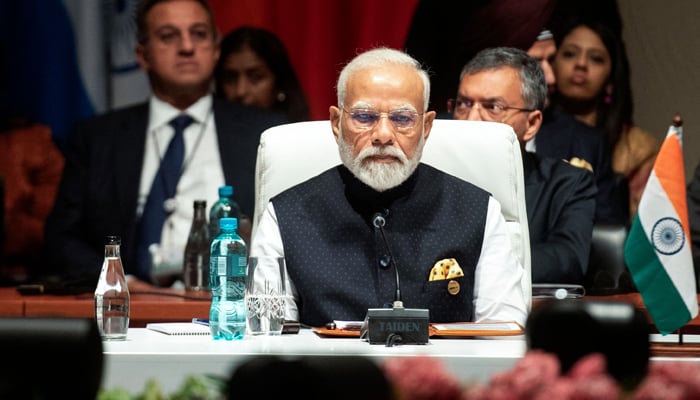By Touqir Hussain
Georgetown University
US

When should a country become aware that its foreign policy is past its shelf life and change is long overdue?
It’s when the nation is being left behind in a rapidly changing world, its diplomatic space is shrinking, it struggles to make new friends and retain old ones, and its enemies are no longer afraid of it.
Realistically speaking, foreign and domestic policies are inherently interlinked. If there is something wrong with a country’s foreign relations, it is largely because something is wrong with its domestic policy.
Pakistan’s domestic policy has made it dependent on external powers. This dependency creates imbalanced relationships, eroding the country’s ability to find new allies, while at the same time discouraging the development of its own domestic strength.
This has left it weak and vulnerable to exploitation. Below is a brief story of how it all happened.
A historical review of the foreign policy
Pakistan has great diplomats, but diplomats do not make policy; the political leadership does. What is even more interesting about Pakistan’s foreign policy is that it has historically prioritized the role of the security establishment.
Initially, Pakistan had no choice. With the newborn state facing an existential challenge to its security and economic survival, it searched for a strategic relationship with a major power.
At the time, the search for a major strategic partner, the arrival of the Cold War in South Asia, and the United States’ search for allies all fit perfectly together. American assistance established a balance of power in the region, securing Pakistan’s survival and its economic assistance also helped the newly-founded state build a platform for future economic development.
The US connection strengthened the elite-based ruling establishment, particularly the army, as they provided the services Washington was looking for. The army therefore became the predominant player in Pakistan’s political life. The Pakistan army’s services, the country’s geopolitical location, and its Islamization made it an attractive partner for different reasons, to China, the US and Saudi Arabia, who became its principal benefactors.
Given the multiplicity and relative permanence of interests that bind China and Pakistan together, the relationship between the two countries became strategically significant to Pakistan as well. But the other two remained largely transactional and truncated.
Pakistan’s foreign relations have no doubt had their success stories, which have been crowned by the Pak-China friendship. Pakistan has stood up well to India’s hegemony and its nuclear capability, for which both the civilian and military leaderships are to be credited, has not only been good for the country’s security but also for peace in the region. Pakistan has also enjoyed a high profile in multilateral diplomacy and has had excellent relations with the Muslim world.
The good old days
But the best days of our foreign policy are long gone as the policy has increasingly been made less out of concern for national interest and more by the leadership’s own priorities and pursuit of political power.
The rise of extremist outfits, born out of Pakistan’s strategic ambitions and Washington’s ill-conceived wars, have come to threaten our internal stability and economic future. Instability thrives when a state is too weak and ambivalent to act. The hybrid system has split the authority to act and the responsibility for action, providing on the one hand for indecision, thoughtless or even reckless actions, and on the other for lack of accountability.
The ruling establishment’s response to the deepening crisis a few years ago was to make a rhetorical switch to geo-economics — economic policies pursued on the basis of global economic and geopolitical considerations.
It was too little, too late.
Geo-economics largely remains a slogan as Pakistan fails to make necessary shifts. The underlying structural economic weaknesses, poor governance, and lack of political stability do not make Pakistan a good partner or an attractive market for foreign investors. As former finance minister Miftah Ismail said in a recent interview , “In the last 20 to 25 years, we have not solved a single big problem”.
Where do we go from here?
Pakistan’s organizing idea has long been addicted to a world that is now extinct. The geopolitical environment, which it banked on for decades to define its value for big powers, no longer exists. The organizing idea of Pakistan itself — an elitist-led country dependent on external help — has failed.
Pakistan would do well by studying and adapting to the far-reaching changes the world has undergone at all levels. Under the umbrella of an unsteady world order, led by the US and China, there are several middle and aspiring big powers multi-aligning and networking through mini-forums, ad hoc groupings and shifting coalitions at the global and regional levels with or without getting involved in the US-China rivalry.
It is already apparent how multi-alignment is enhancing countries’ bargaining power individually or as groups. This can create a whole new set of opportunities for a wider circle of small and middle powers. To enhance economic benefits, countries are strengthening or loosening traditional ties, and seeking new friendships. Old, fixed and unchanging alliances are being questioned. The idea is to get economic benefits from wherever you can by cooperating while competing and subordinating your conflicts to economic interests where necessary. Conflicts are not being shelved, but countries are no longer making them obstacles to cooperation.
There is still some hope
Pakistan’s foreign relations, on the other hand have literally been frozen in time, except for its strong relations with China. Luckily, the relations have enough residual strength to provide a platform for renewal through a proper foreign policy. But a lot more has to change to create a new foreign policy.
Here is where we stand now.
What began as a tentative tactical alliance between China and Pakistan 73 years ago has matured into an extraordinary relationship of mutual strategic and economic dependence. The China connection has become ever more important for Pakistan, and not for all the right reasons.
The dependency syndrome, anti-Americanism and a warped view of ‘independent’ foreign policy have led to the perception that with China at its back, Pakistan does not need to prioritize its other relationships.
The fact is that anti-Americanism is not a badge of independent foreign policy. Pakistan’s mounting economic difficulties, rising challenges to internal stability and continuing threats to external security require good relations with Washington. China cannot be the answer to all of Pakistan’s problems, nor should it be expected to be. China is a strategic partner but cannot be a substitute for other relations. To develop relations with both China and the US, Pakistan’s diplomacy needs to be flexible. Ties with China may be indispensable, but ties with America are necessary.
America has taken nothing from Pakistan that its leaders have not given of their own accord to strengthen their position in the domestic struggle for power. This has to stop. The relationship must no longer be based on Pakistan’s role as an adjunct to America’s wars. It has to find a new sense of purpose from both sides and Pakistan must know the terms of engagement clearly.
If the US is unreliable, the answer is not to avoid a relationship with it. It is to have a relationship that is premised on caution instead of blind trust.
Pakistan wishes to enhance its relationship with the US, particularly by fostering economic collaboration. While the US doesn’t possess vital economic interests in Pakistan, it recognizes the potential significance of strengthening economic bonds to achieve its objectives in the region. Many areas of potential cooperation, including energy technology, agriculture and IT, are being discussed. Washington also wants to help with healthcare and education.
In the Middle East, relations with Iran are important but challenging, leaving room for improvement. Pakistan also maintains good relations with Turkey.
However, Islamabad should not expect its closeness with Arab countries to continue. While Pakistan remains relevant, some of its historical importance has dimmed in light of emerging alignments in the region. As for Saudi Arabia and the Gulf states, we cannot ignore the fact that two million Pakistanis work in Saudi Arabia and are the biggest source of remittances for the country.
Regarding financial assistance to Pakistan, the Gulf states are shifting their strategy . They are now prioritizing the diversification of their own economies, anticipating a transition away from fossil fuels in the future. Their aim is to engage in strategic investments rather than providing grants driven by ideology. Consequently, they are emphasizing the need for structural and policy reforms in Pakistan before extending financial support.
Finally, as for Russia, the two countries decided in 2014 to seek closer relations that had been previously inhibited due to Moscow’s strategic ties with India. But concrete progress is yet to be seen. One of the possible reasons could be Moscow’s reported dissatisfaction with Pakistan over its policy on the Ukraine war. Even though the scope for expanding relations with Russia is limited, Pakistan should persist in its efforts to strengthen ties.
The biggest foreign policy challenges
No issue impacts Pakistan’s internal and external challenges as much as peace and stability in Afghanistan. It is not just the Americans or Soviets that lost since the overthrow of Afghanistan’s monarchy and the wars that followed. Pakistan and Afghanistan too have lost by becoming tributaries and confluences of extremist influences and instability.
Pakistan’s policy planners demonstrated either complete disregard or lack of awareness of these changes as they persisted in their misguided approach of nurturing and safeguarding the Afghan Taliban for decades. The Taliban were never going to be the solution to Afghanistan’s problems or our problems with India.
The irony is that the present Taliban are not as domestically stable as the first dispensation of the 90’s but they have a greater chance of being accepted by the global community. The Taliban government is reaching out to other countries in the region. It needs India’s support, and it is also using its relations with India as leverage against Pakistan.
The Afghan Taliban are never going to abandon the Tehreek-i-Taliban Pakistan (TTP) either. Their support for them is both a leverage against Pakistan and a reciprocation for TTP’s help during the Afghan war — something they may need again.
The solution to the TTP problem has to be found within Pakistan. Seeking it in Afghanistan could deteriorate relations with the Taliban and exacerbate Afghanistan’s instability, which is not in our best interest.
The Taliban may be able to control Afghanistan but not stabilize it — at least not to the extent that it could become an attractive economic partner in the region. Without this, Pakistan is never going to realize its dream of becoming a hub for trade investment and energy in the region. Because of its security-dominated foreign policy, Pakistan has thus effectively shut one door to economic progress. Another door, India, is also closed, for which Pakistan of course is not entirely to blame.
Pakistan’s security policies have limited its options for economic engagement in the region in more ways than one. The policies have given rise to extremist and militant organizations within the country, inhibiting foreign investments, along with weak rule of law and poor governance for decades. Not to mention its dependency-oriented foreign policy has reduced its list of friends and benefactors, leaving it with only a few options for global engagement.
Pakistan needs a new approach which is currently absent as it continues to be consumed by ideology and internal struggles for power. Going for the ‘Jihadist option’ has boomeranged while India’s strengths have multiplied, earning it a popular global status.
Our interest in talking to India serves no purpose when India is not interested in dialogue. It is not interested in anything Pakistan has to offer, be it economic relations or Kashmir — India thinks it has found the solution to Kashmir without Pakistan’s help.
Pakistan wrongly assumes that its geopolitical position holds evergreen significance. Our geopolitical position is only an asset for a stable and strong Pakistan, but for a weak and unstable one, it is a liability.
The bottom line is that a nation’s ability to influence foreign relations, especially in today’s world, depends on economics, which in turn is dependent on political stability and good governance.
Economic power is at the core of national strength. It enables a state to have a good defense capability, enriches the quality of life of citizens, and has the potential to attract friendly relations with other countries from a non-subordinate position.
The dominant theme of all emerging regional and global groups in recent years is economics. And there are opportunities for Pakistan as well, but if the current state of Pakistan persists, it will remain on the sidelines.
Pakistan is secure enough to take calculated risks and embrace change. With ample national strength, the nation can navigate towards a secure and prosperous future for its people. For that, we need a foreign policy that begins at home and is housed in the foreign office which should be owning the foreign policy, not renting it.
(The writer, a former Ambassador, is adjunct professor at Georgetown University and Visiting Senior Research Fellow at the Institute of South Asian Studies, National University of Singapore. Header illustration: Mushba Said/ Dawn.com File - Dawn)









